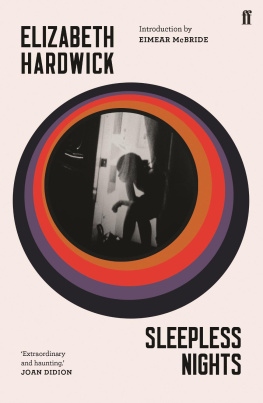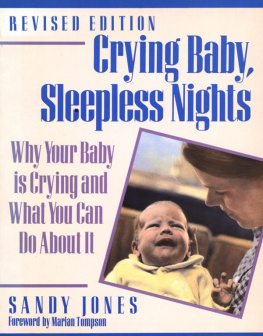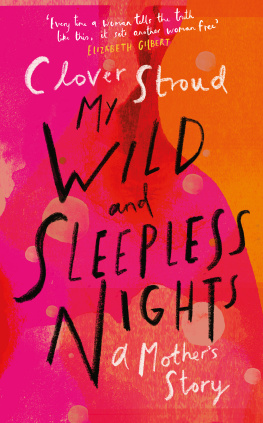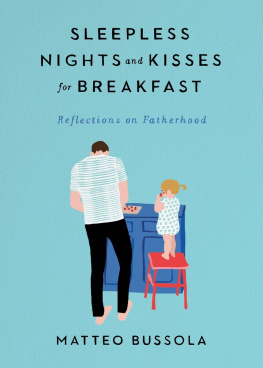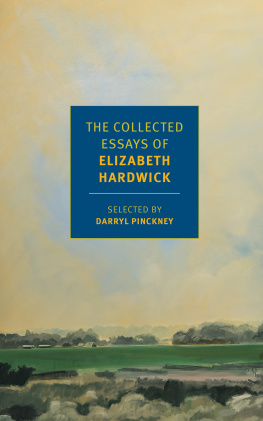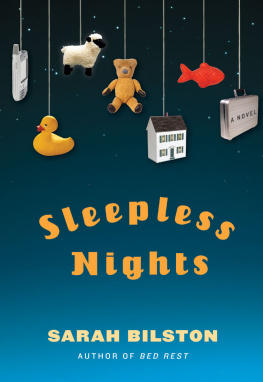Within the first few pages of Sleepless Nights the narrator writes of her fondly remembered, now long-deceased, mother: I never knew a person so indifferent to the past. It was as if she did not know who she was. Its an unsentimental, matter-of-fact kind of assessment of a life which, having failed to be the occasion of much self-examination in its possessor, is now dwindling unhindered into a soon-to-be-forgotten past. Hardwicks narrator and fellow Elizabeth doesnt fault her mother for this dimly lit sense of self or lack of strongly asserted identity. Rather, in much the same way that she and her many siblings respond to their mothers prodigious childbearing by offering up a singularly low birth rate of their own, she simply adopts a fundamentally different approach. Sleepless Nights first published in 1979 when its author was sixty-three, renowned and respected as one of the pre-eminent writers in her field stands in polar opposition to this maternal model of the deserted self and, most particularly, of the deserted female self. There is no confusion of ipseity or incoherence of purpose. This is a narrator who knows who she is and, pretty much, how she got to be that way. The resultant, restive narrative is a deep delve into the processes of her thinking as she sleeplessly rolls back and forth across ideas, memories and conclusions. For the reader it is this encounter with a formidable mind, working hard, mapping the journey from its root consciousness through a myriad of perceptions and recollections out into the physical world where it may, or may not, allow itself to be changed by what it finds which forms the spine of pleasure that holds the fragmented narrative together.
Hardwicks narrator cares to see rather than be seen by the world. And just as we are privy to her innermost thoughts on whatever her perception casts itself across, so she also holds in scantily clad contempt those too blinded by their own self-interest to see themselves, or their actions, with anything other than the most blistering truth. At the same time her empathy, and sympathy, for the harshly endured lives of many of the women her gaze falls upon is without question. Even if powerless to comfort them, her careful witness is an act of respectful recognition the like of which most have been denied for all of their turbulent, difficult lives. What matters is that she sees them and the manner in which she makes us see them, and herself, is significant too. Her selection of a dislocated narrative mode only increases the readers sense of absorption into her late-night multiverse.
As one of the great literary critics of her era, arguably of any era, Hardwick had little truck with the perennially voguish notion that literary fiction should spend less time thinking and more time devising convoluted plots. On being quizzed about the absence of the twists and turns of genre in her work, she replied: If I want a plot Ill watch Dallas. This understanding that plot and story are not the same, that plot is not appropriate to every narrative while story is indispensable to all, propels the book forward and permits a richer, more satisfying exploration of her subjects to take place. So, although there are chapters here, paragraph breaks, section ends etc., there is no real reason for them. The narrators thoughts follow their own insomnia-infused logic, jumping easily across space and time, connected only by the slimmest of associative threads.
This disinterest in a rigid delineation of form also filters through into the books content. While published as a work of fiction, Sleepless Nights contains many verifiably autobiographical elements: Hardwick was born into a large family in Kentucky. She did move to New York and live in a mariage blanc with a young gay man. As a writer, she did hold a place at the centre of the literary world. In real life she spent time with Billie Holiday and, famously, did fall out of the commonest of plurals to become no longer a we when the poet Robert Lowell left her after twenty-three years of marriage. That said, however, the novel still remains too formally and intellectually promiscuous to be consigned either to the cul-de-sac of auto-fiction or the imaginative straitjacket of memoir. It is certainly the case that many of the places she personally knew the Kentucky of childhood, the inherited house in Maine, the fraternity sofa upon which she spent a woeful night and the scuzzy yet transformative delights of her beloved New York with its graves next to its banks are all present and correct. Present also are the people she knew, liked and loved in those places: parents, friends, old lovers who bitterly claim only those women with money can violate the laws of probability, the aforementioned Billie Holiday with her murderous dissipation and luminous self-destruction, the neighbour for whom poverty came like a bulldozer and the incestuous bourgeoisie of intellectual Amsterdam not to mention the stream of ill-fortuned maids. And we mustnt leave out her abortionist, who afterwards handed her a card for his funeral business. She fixes him there in time along with the rest of them, although, tellingly, hes the one she nearly forgets. The readers impression is certainly that these beautifully, humanely drawn portraits are of actual people with whom her path has crossed. That they have lived and struggled in their own right, beyond the clich to which they might so easily have been condemned. Society tries to write these lives before they are lived, Hardwick says. It does not always succeed. Neither does she fall into that trap. Her descriptions of them are absorbingly sensual and contain the kind of linguistic tactility that might easily lull the lazy or sentimental into reading every aspect of the novel with the foreshortening expectation of finding merely autobiography there.
If a verifiably historical record was what Hardwick had wanted to create, however, theres no reason to suppose she would have been coy about carrying it out. Although, for example, her divorce from Lowell is obliquely referred to, his ruthless appropriation of material from her personal letters to him in the years afterwards, and its subsequent appearance in his published work, remains unexcoriated. Indeed, when read in the light of such intimate betrayal, Sleepless Nights unwillingness to engage in any score settling or setting straight of the record is nothing short of remarkable and, for hungry wound-hunters, doubtless a disappointment. While the book does possess a quality of allowed intimacy, verbatim reports of unpleasant happenings are not what are preoccupying Hardwicks busy mind as it ranges around its night thoughts. If anything, her antipathetic response to Lowells aggressively specific Yet why not say what happened? might be contained in her very different question: Can it be that I am the subject? Perhaps this is a latent shade of the maternal self-desertion showing through or it may, more simply, be the rejoinder of a woman who has made a self for herself and therefore finds that self under no obligation to prove anything to anyone. Either way, the immobility of the literal and factual is too restrictive for Hardwick. For her the sum of a lifes acts is far too insufficient a calculator of value, or meaning, to warrant the effort required to catalogue them. Fittingly, and perhaps unsurprisingly, Hardwick chose to remain both ambiguous and ambivalent on the issue of autobiography in Sleepless Nights. In response to Darryl Pinckneys 1985 assertion in an interview for the Paris Review that the novel had the tone of lived experience, of a kind of autobiography she replied: I guess so. After all, I wrote it in the first person and used my own name, Elizabeth. Not very confessional, however. And not entirely taken from life, rather less than the reader might think.

